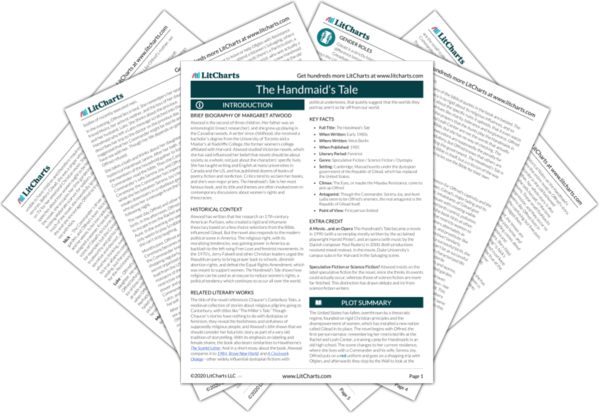Summary
Analysis
Offred sometimes sings herself “Amazing Grace,” a song now banned for the word “free.” She also sings a song about loneliness that she remembers from her mother’s cassettes. The only other music in the house is Rita’s occasional humming, or Serena Joy illegally listening to recordings of her young self singing religious songs.
“Amazing Grace” is a religious song that also was an important slave spiritual before the American Civil War. The song links Gilead to the Confederacy, and highlights how the Bible can be interpreted both for freedom and for slavery.
Themes
It’s hot and soon Offred will wear her cotton summer dresses. She remembers Aunt Lydia disdaining the scantily-clad women of the past, who she said looked like cooking meat. Aunt Lydia thought that such women brought certain things upon themselves. In a memory of Offred’s from the Rachel and Leah Center, as Aunt Lydia began to explain something about men and women lying out in public, she began to cry. Aunt Lydia said she was trying to do her best for the Handmaids, and that it was not easy.
As in Chapter 8, we see how Aunt Lydia cunningly acts like she’s on the side of good. She puts on a calculated show of caring, even while she indoctrinates the Handmaids to Gilead’s rules. Still, the passage shows that Gilead has improved some things, like eliminating sexual harassment.
Themes
Offred retreats into another memory, of Moira. In the memory, Moira is planning an “underwhore” party to sell sexy lingerie. Moira makes a joke about how women feel the need to compete with porn, and Offred laughs. Back in the present day, Offred muses about how she and others ignored the gradual changes that lead to Gilead, including the discoveries of the beaten corpses of women. She thinks that it’s easy to ignore bad things when they happen to other people.
Moira’s party is a feminist attempt to take control of female sexuality. But Offred’s previous memory of Aunt Lydia throws Moira’s actions into doubt. Is the “Underwhore” party really a promotion of women’s rights, or does it feed right into the culture of porn and men’s gratification?
Themes
Offred sits at the window seat, which has a cushion that says “faith” on it (though it’s illegal for her to read). Veiling her face with the curtain, she sees the Commander go out to his car, with Nick standing by. She imagines throwing something out the window at the Commander, then remembers dropping water-filled bags on boys with Moira in college. The Commander leaves, and Offred can’t quite figure out her feeling towards him, which is neither hate nor love.
The faith cushion, just by having writing on it, forces Offred into a kind of passive rebellion. This memory of Moira further complicates Offred’s attitudes towards feminism. Is Moira really teaching the boys anything, or is her bag-dropping simply flirtatious?
Themes
Get the entire The Handmaid’s Tale LitChart as a printable PDF.













